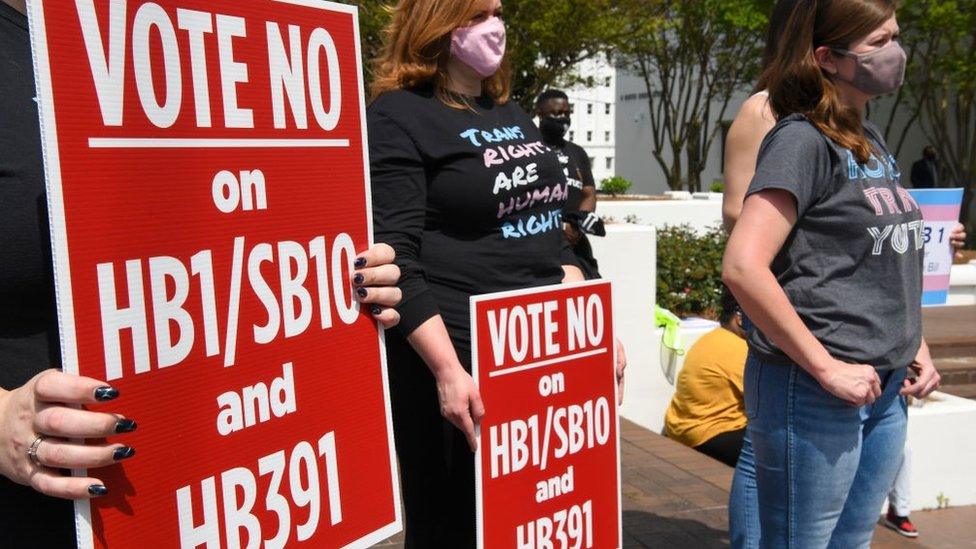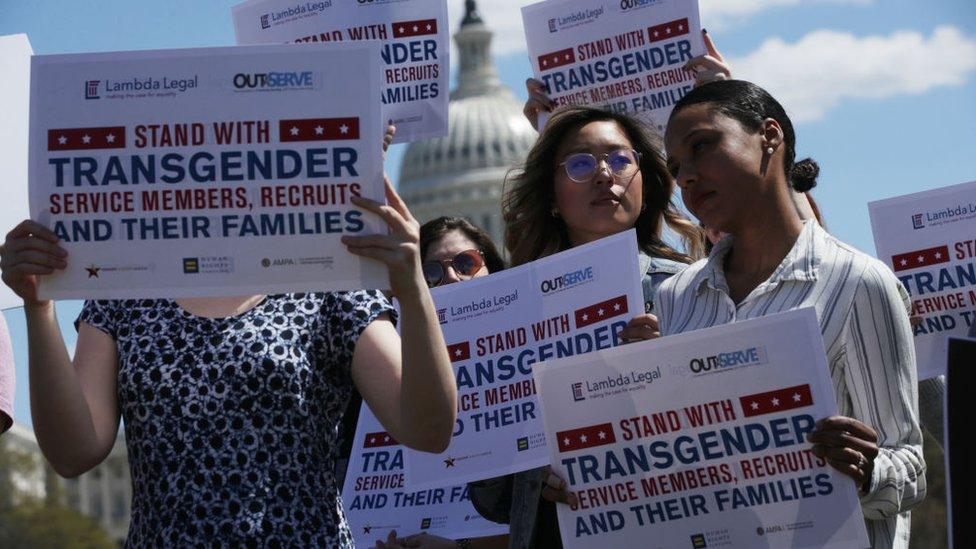US Supreme Court declines transgender bathroom appeal in win for student
- Published

The decision marks a victory for Gavin Grimm after a six-year legal battle
The US Supreme Court has declined to take up a school's appeal in a transgender student bathroom case, handing a win to LGBT rights activists.
The justices let stand a lower court ruling that a Virginia school had been discriminatory by barring a transgender student from the men's bathroom.
The decision marks the end of a six-year legal battle launched by the student, Gavin Grimm.
It comes amid efforts in some states to limit transgender student rights.
Monday's order does not set national precedent on whether schools must allow transgender students to use the bathroom that fits their identity.
The court did not offer any comment on the refusal of the school appeal, as is typical for such orders.
Two of the nine justices, conservatives Clarence Thomas and Samuel Alito, said they would have heard the school's appeal.
Mr Grimm celebrated Monday's order on Twitter, saying he was "honoured" to have been a part of this victory for transgender rights.
"I was barred from the bathroom at my high-school seven years ago, when I was 16. Six years ago, at 16, myself with the ACLU [American Civil Liberties Union] filed suit in response to that discrimination," he wrote. "Now it's over. We won."
Mr Grimm first challenged the school board's policy in 2015 while a student at Gloucester High School in eastern Virginia.
The school had initially allowed him to use the men's bathroom after Mr Grimm explained he had transitioned to male. But he was later barred from using it after complaints from several adults.
Mr Grimm was told to use newly installed single-person bathrooms instead.
His lawsuit focused on the 14th Amendment to the US Constitution, which says no state can deny "equal protection of its laws" to any of its people.
Lawyers for the school board had argued that allowing transgender students to use the bathrooms of their choice would affect privacy rights of other students. The ACLU said forcing Mr Grimm to use separate facilities "stigmatised him" and amounted to sex-based discrimination.
The lawsuit made its way up to the Supreme Court after a series of cases in Virginia.
The order upholding Mr Grimm's victory is seen as a significant win for transgender student rights.
While the battle for trans rights once centred around these so-called bathroom bills, more recent legislation in conservative states has taken aim at transgender students in school sports and gender confirming healthcare.
In March, Mississippi's governor signed a law banning transgender athletes from competing in girls' sports at school and in April, Arkansas became the first US state to outlaw gender confirming treatments and surgery for transgender people under the age of 18.
In Tennessee, lawmakers have passed a flurry of legislation aimed at transgender Americans, including a law banning transgender students from playing girls sports in public schools and a bathroom bill requiring businesses and government facilities to post a sign if they let transgender people use multi-person bathrooms, locker rooms or changing rooms associated with their gender identity.
You may also be interested in:
Watch Andi's remarkable journey: 'I can finally be who I've always been'
Related topics
- Published26 June 2020

- Published23 May 2018

- Published6 April 2021

- Published20 June 2021
